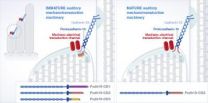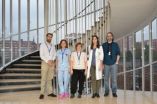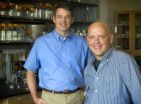(Press-News.org) EAST LANSING, Mich. — Even the smartest college students suffer academically when they use the Internet in class for non-academic purposes, finds new research by Michigan State University scholars.
The study, funded by the National Science Foundation, speaks to typical lecture-hall culture in which professors compete for students' attention with laptops and smartphones.
"Students of all intellectual abilities should be responsible for not letting themselves be distracted by use of the Internet," said Susan Ravizza, associate professor of psychology and lead investigator on the study.
Ravizza and colleagues studied non-academic Internet use in an introductory psychology class at MSU with 500 students. The working theory: Heavy Internet users with lower intellectual abilities – determined by ACT scores – would perform worse on exams. Past research suggests smarter people are better at multitasking and filtering out distractions.
But surprisingly, that wasn't the case. All students, regardless of intellectual ability, had lower exam scores the more they used the Internet for non-academic purposes such as reading the news, sending emails and posting Facebook updates.
Ravizza said that might be because Internet use is a different type of multitasking, in that it can be so engaging.
The study also showed students discounted the effects of Internet use on academic performance, reinforcing past findings that students have poor awareness of how their smartphones and laptops affect learning.
Ravizza said it would be nearly impossible to attempt to ban smartphones or other electronic devices from lecture halls. "What would you do, have hundreds of people put their cell phones in a pile and pick them up after class?" Such a ban might also be a safety issue, since cell phones have become a primary source of receiving emergency messages.
The study appears in the online version of the journal Computers & Education. Researchers Zach Hambrick and Kimberly Fenn, both from MSU's Department of Psychology, were co-authors.
INFORMATION:
Surfing the Web in class? Bad idea
2014-06-17
ELSE PRESS RELEASES FROM THIS DATE:
MIPT-based researcher predicts new state of matter
2014-06-17
A researcher with the Department of Electrodynamics of Complex Systems and Nanophotonics, Alexander Rozhkov, has presented theoretical calculations which indicate the possible existence of fermionic matter in apreviously unknown state – in the form ofaone-dimensional liquid, which cannot be described within the framework of existing models. Details are contained in Rozhkov's article in the journal Physical Review Letters, and are also available as a preprint at http://www.arxiv.org.
Rozhkov explained that the one-dimensional liquid state of matter is not necessarily one ...
Early elementary school start times tougher on economically advantaged children, study finds
2014-06-17
WASHINGTON - Middle- and upper-class elementary school students in Kentucky demonstrated worse academic performance when they were required to start classes early, compared to peers whose school day started later, according to research published by the American Psychological Association.
Researchers led by Peggy S. Keller, PhD, of the University of Kentucky, theorized that earlier school start times would be associated with lower standardized test scores, poorer attendance, more students being left back, lower school rank and school underperformance. They also expected ...
Researchers identify mechanism that could help old muscle grow
2014-06-17
[Boston, MA June 17, 2014]─ Sarcopenia – the significant loss of muscle mass and function that can occur as we age – is associated with many chronic conditions such as diabetes, high cholesterol and obesity. In findings published online ahead of publication in the September 2014 issue of the FASEB Journal, researchers at the Jean Mayer USDA Human Nutrition Research Center on Aging at Tufts University identify a muscle-building mechanism that could be important in addressing sarcopenia.
When people strength train the body responds by making muscle. The researchers ...
Hearing protein required to convert sound into brain signals
2014-06-17
HEIDELBERG, 17 June 2014 – A specific protein found in the bridge-like structures that make up part of the auditory machinery of the inner ear is essential for hearing. The absence of this protein or impairment of the gene that codes for this protein leads to profound deafness in mice and humans, respectively, reports a team of researchers in the journal EMBO Molecular Medicine.
"The goal of our study was to identify which isoform of protocadherin-15 forms the tip-links, the essential connections of the auditory mechanotransduction machinery within mature hair cells ...
The American College of Chest Physicians releases updated PAH guidelines
2014-06-17
June 17, 2014, Glenview, Illinois--The American College of Chest Physicians (CHEST) announced today the Online First publication of Pharmacological Therapy for Pulmonary Arterial Hypertension in Adults: CHEST Guideline in the journal CHEST. Pulmonary arterial hypertension (PAH), a rare form of pulmonary hypertension, can strike anyone, but individuals with connective tissue diseases such as scleroderma, liver disease, or HIV infection, are more likely than the general population to have PAH. These new guidelines provide recommendations to help clinicians manage PAH using ...
MIPT develops unique greenhouse gas meter
2014-06-17
Laboratory for the Spectroscopy of Planetary Atmospheres of Moscow Institute of Physics and Technology has come up with a high-resolution meter to gauge the concentration of gases in the atmosphere with unparalleled precision. The infrared spectrum radiometer is described in an article recently published in the journal Optics Express.
The paper, authored by Alexander Rodin, Artem Klimchuk, Alexander Nadezhdinsky, Dmitry Churbanov and Maxim Spiridonov, says that the new spectrum radiometer is 100 times more precise than the best available near-infrared spectrometers, ...
In the quest for safer treatment for systemic lupus erythematosus
2014-06-17
This news release is available in Spanish.
Systemic lupus erythematosus (SLE) is a chronic autoimmune disease. It can affect various organs, in particular, the skin, joints and kidneys although it displays great variability in extent and seriousness depending on the patient. Approximately nine out of every ten patients are female and it appears in one woman in every thousand.
As Dr Guillermo Ruiz-Irastorza, head of the Autoimmune Disease Research Unit of the Hospital Universitario Cruces, explained, traditionally lupus has been treated mostly with glucocorticoids ...
Genetics of sex -- beyond just birds and bees
2014-06-17
BETHESDA, MD – June 17, 2014 – Sex is everywhere in nature. Whether it's a male bird singing to mark his territory or a tiny yeast cell secreting chemicals to attract the opposite mating type, sex has profoundly shaped the appearance, behavior and evolution of many organisms. The genetic and evolutionary forces underlying sex differences and sex determination are crucial for understanding much of the natural world, including human biology.
In recognition of the importance of these topics, the Genetics Society of America journals GENETICS and G3: Genes|Genomes|Genetics ...
The genes behind immunity
2014-06-17
BETHESDA, MD – June 17, 2014 – Immunity is what stops you dying from a common cold or a tiny pinprick. Differences in resistance or tolerance to disease influence who catches the bug that's going around the office, or which species succumb to the deadly fungus devastating frogs around the world. But immunity involves more than just the immune cells that recognize and hunt down pathogens. It is influenced by the host's health, physiology, behavior, and environment. And underlying all these processes and their intricate interactions are the genes that govern their function.
This ...
UT Arlington scientists suggest 'Fragile Y Hypothesis' to explain chromosome loss
2014-06-17
A UT Arlington research team says their study of genetic information from more than 4,000 beetle species has yielded a new theory about why some species lose their Y chromosome and others, such as humans, hang on to it.
They call it the "fragile Y hypothesis."
The biologists' idea is that the fate of the Y chromosome is heavily influenced by how meiosis, or the production of sperm, works in an organism. They believe the size of an area where X and Y genetic information mingle or recombine can serve as a strong clue that a species is at risk of losing the Y chromosome ...




